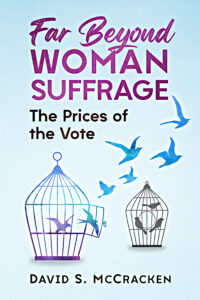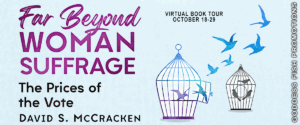 Helping me start a new week is author David McCracken and we’re chatting about his new alternative history novel, Far Beyond Woman Suffrage: The Prices of the Vote.
Helping me start a new week is author David McCracken and we’re chatting about his new alternative history novel, Far Beyond Woman Suffrage: The Prices of the Vote.
During his virtual book tour, David will be awarding a $10 Amazon or Barnes and Noble (winner’s choice) to a lucky randomly drawn winner. To be entered for a chance to win, use the form below. To increase your chances of winning, feel free to visit his other tour stops and enter there, too!
The book will be on sale for $0.99 during the tour
Bio:
David McCracken grew up near Winchester, KY, and now lives near Winchester, VA, with his wife. He has three children, two stepchildren, seven grandchildren, and a big black dog. David graduated from schools in Kentucky and Virginia and worked as an economist, programmer, and teacher before retiring. Writing is now his full-time pursuit, and he’s begun a third novel.
Welcome, David. Please tell us about your current release.
It isn’t just about women in long skirts finally voting. The racists and the rich know that, and the politicians worry.
Mercy Martin has an inside view as the battle for woman suffrage nears a climax, but she encounters many puzzles:
- So many women and Southern states oppose votes for women;
- So many people are afraid it would bring on free love, abandonment of family, economic catastrophe, or communism.
- So many suffragists are willing to abandon black women voters.
From an innocent teen to a young adult, Mercy has a central role in the campaign. She advances from confinement in a suffragist jail cell to the national campaign for the suffrage amendment. She campaigns around Tennessee, ending at the capitol for the explosive climax in the last state that might ratify the amendment and grant the vote to women.
Why should something so clearly right be so hard, and why were some bitter compromises made? Mercy is right in the middle, relied on by key players. Along the way, she acquires a husband, a baby, and better parents than she was born with.
This is an intimate view via alternative historical fiction, as accurate as it can be and as thoughtful and moving as it must be. In this first novella of a series, Mercy jumps into the campaign for woman suffrage and prepares for a vital role in the coming decades. She’ll continue on into the wider civil rights struggle growing out of woman suffrage.
What inspired you to write this book?
I had just finished my first novel, Fly Twice Backward: Fresh Starts in Times of Troubles, an alt-history sci-fi multi-media autobiography. (Got all of that?) I got interested in the centennial of the Woman Suffrage amendment. As I read more about it, I was impressed by the dramatic richness of the event. I thought about a possible storyline and saw I needed to put a young woman into the heart of the struggle. I liked writing heroic women in Fly Twice Backward, so I landed on Mercy. She got herself into the fray and acquired a personal life that fit the personal side of woman suffrage. Her parallel personal story would add human context and help me work in the needed history without being too didactic. The rest of the story just grew as I worked from that base. I needed an exciting opening, and Mercy provided it landing in a jail cell and learning more about how she got there. Her developing story provided a mature element that moved me from the YA novel I’d planned into an A-YA. I think I ended with a book older teens could enjoy as well as adults.
Excerpt from Far Beyond Woman Suffrage:
After burning speeches, our members are attacked by schoolboys leading a mob. As the women light new fires, the mob moves on to the nearby NWP headquarters, where they pull down the watchfire bell and destroy banners. Eighteen of our women are charged with building fires on bordering government property and making disorderly speeches. Police release 12, who then return to the park and are arrested again. They refuse to post bond and go on a hunger strike. Officials are reported considering forcible feeding. On February 9, a hundred women demonstrate, burning speeches and a straw effigy of President Wilson with two thousand onlookers.
I ask Sue as we eat lunch, “Why are people so terribly upset by the idea of letting women vote? I could understand when it appeared that we were opposing the country’s war policy. At least there was a fear of the dissention causing our men to be killed in the war. But the war is over.”
“I’ve puzzled about that, Mercy. Any time unity is threatened, I think fear arises from a feeling that in disunity, there is weakness. This hostility after the peace is an extension of that fear, maybe, like a bad dream that continues to scare us even when we wake. The feeling persists. And bigoted people just seize on any reason, having none of their own.”
Touché. I mull that over. “But their reaction is so out of proportion to what we’re doing, asking to be allowed to vote.”
After a sigh, she says quietly, “And there’s racism. The idea of negro women voting, and perhaps helping to stop the ongoing blocking of their men voting, is terrifying beyond all reason. Guilt. The South knows what they’ve done and turn the guilt to fear and rage. On the subject of slavery, Jefferson said, ‘I tremble for my country when I reflect that God is just, that his justice cannot sleep forever.’”
What exciting story are you working on next?
Far Beyond Woman Suffrage: Testing the Limits
Here’s the blurb:
The vote at last is won for women, so what’s next for our suffragist? In the Far Beyond Woman Suffrage series, this second novelette follows Mercy Martin Hamblin testing what women can do now and where she should throw her efforts.
She’s started at the University of Tennessee to prepare for teaching social studies. Still, she’s plagued by the women and men of color left behind in the push, letting bigots decide what “local conditions” will permit via Jim Crow. She is also determined that the peace her husband died for in France will last. With three loving grandparents to watch her wonderful toddler as she studies, Mercy is blossoming. She is coming to see suffrage is about more than putting ballots in a box, so she’s preparing to do the work of expanding suffrage’s choices to allow people to govern their own lives.
Mercy’s Grandma finally says, “Start dating, Sweetheart. You have so much to offer a man. It’s time.” Her body and heart have been telling her the same thing. There’s that cute congressman who clinched the woman suffrage amendment’s passage and a fellow teacher who tells about wartime adventures that could have been her Joe’s.
She’s not impressed with what her fellow Republicans are doing. They seem governed by greed, but the Southern Democrats are openly racist. Meanwhile, the countries that fought a world war for democracy are busy carving out colonies.
There are many exciting developments in transportation, science, and entertainment, and Mercy loves them, especially the Stutz Bearcat her father-in-law bought her for commuting. However, there’s still appalling ignorance, poverty, and injustice. And indifference, but not in Mercy!
As the United States plunges into the Great Depression, people are suffering. Mercy is uneasy about the response of the Republican president and impressed with what she hears from the Democratic candidate. Maybe she should get involved.
In this alternative history, the ground is being laid for Mercy to join in, though it may hurt her staunchly Republican family.
Anything can happen ….
When did you first consider yourself a writer?
I began to believe as my first novel, Fly Twice Backward: Fresh Starts in Times of Troubles was nearing completion and I saw it was really good.
 Do you write full-time? If so, what’s your work day like? If not, what do you do other than write and how do you find time to write?
Do you write full-time? If so, what’s your work day like? If not, what do you do other than write and how do you find time to write?
I write full-time now, with lots of research, from when I get up and finish the paper and mail until I watch the even news with my wife. Sometime my writing continues after I go to sleep, so I get up to do it for real. When I can I walk my dog in the woods. Finding time is little problem: when I retired, I decided to be a full-time writer.
What would you say is your interesting writing quirk?
When I edit, I highlight changes in green, then go back and modify as needed and remove the highlights. Not all the quirky, eh!
As a child, what did you want to be when you grew up?
I wanted to go to Annapolis to be a Navy officer. That was wrecked by poor vision, by Navy standards.
Anything additional you want to share with the readers?
I am terrified the Republicans are throwing democracy and truth away.
Links:
Website | Goodreads | Amazon
The book will be on sale for $0.99 during the tour
Thanks for being here today, David.

